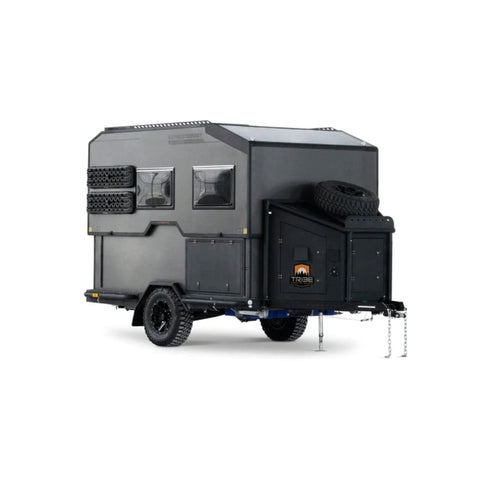Which Trailer is Right for You? Understanding the Differences Between Passenger Trailers

When it comes to purchasing a new passenger trailer, the options can be overwhelming. From camper trailers to travel trailers, off-road trailers to overlanding trailers, each type has its own unique features and benefits.
Understanding the differences between these types of trailers is essential in making an informed decision that best suits your needs and lifestyle.
In this blog post, we will break down the key differences between camper trailers, travel trailers, off-road trailers, and overlanding trailers, providing you with the information you need to make the best choice for your next adventure.
Camper Trailers
Camper trailers, also known as pop-up trailers, are small, lightweight trailers that are designed to be towed by a car or small SUV. They are typically less than 20 feet in length and have a gross vehicle weight rating (GVWR) of less than 3,500 pounds. They typically have a folding or collapsible design, allowing for easy storage and transport. Some popular features of camper trailers include canvas pop-up tents, portable toilets, and basic cooking facilities.
One of the main benefits of camper trailers is their compact size and ease of towing. This makes them great for short trips and weekend getaways, as they can be easily stored in a garage or driveway when not in use. They are also relatively inexpensive, making them a great option for those on a budget.
However, camper trailers do have some limitations. Due to their small size, they often lack some of the amenities found in larger trailers, such as a full-size kitchen or bathroom. They also typically have limited storage space, which can make packing for longer trips more difficult.
Travel Trailers
Travel trailers, also known as conventional trailers, are larger and more substantial than camper trailers. They typically range in size from 20 to 40 feet in length and have a GVWR of 3,500 to 8,000 pounds. They offer more living space and amenities, such as a kitchen, bathroom, and sleeping quarters. Some popular features of travel trailers include slide-out sections, air conditioning, and large storage compartments.
Travel trailers are great for longer trips and extended stays. They offer more comfort and convenience than camper trailers, with amenities such as a full-size kitchen, bathroom, and sleeping quarters. They also have more storage space, making it easier to pack for longer trips.
However, travel trailers are typically more expensive than camper trailers, and they can be more difficult to tow and maneuver. They also require a larger vehicle to tow them, which can be a challenge for some.

Off-Road Trailers
Off-road trailers are specifically designed for rough terrain and off-road adventures. They typically have a more rugged construction and larger wheels and tires. They also have higher ground clearance and off-road suspension to help them navigate rough terrain. Some popular features of off-road trailers include waterproof and dust-proof seals, reinforced frames, and heavy-duty axles.
Off-road trailers are great for those who plan on going off the beaten path. They are built to withstand harsh conditions and can navigate rougher terrain than other types of trailers. They also often come equipped with a variety of features such as built-in water storage, solar panels, and portable kitchens.
However, off-road trailers can be more expensive than other types of trailers, and they often require more maintenance to keep them in good working order. They also require a larger vehicle to tow them, which can be a challenge for some.

Overlanding Trailers
Overlanding trailers are designed for extended, self-sufficient camping trips. They offer a high level of off-road capability and are built to withstand harsh conditions. Overlanding trailers are typically larger and more rugged than other types of trailers and are equipped with a variety of features such as:
-
Solar panels: These allow for off-grid power and independence while on extended trips.
-
Water storage tanks: These provide a reliable source of fresh water while on the road.
-
Kitchen facilities: Overlanding trailers often come equipped with a sink, refrigerator, and stove, allowing for self-sufficient cooking and meal preparation.
-
Additional storage: Overlanding trailers often have ample storage space for gear and equipment.
-
Tents and awnings: Some overlanding trailers come with built-in tents or awnings, providing additional living space and shelter.
-
Heavy-duty suspension and tires: Overlanding trailers are built to handle rough terrain and are often equipped with heavy-duty suspension and tires.
Overlanding trailers are perfect for those who plan on taking extended trips and want to be self-sufficient while on the road. They offer a high level of off-road capability and are built to withstand harsh conditions. They are suitable for people who are looking for an adventure, who want to enjoy the natural beauty of the world and who don't want to be limited by the conventional way of traveling.
Understanding the Differences Between Passenger Trailers Common Questions and Answers
Q: What is the difference between a camper trailer and a travel trailer?
A: A camper trailer is a smaller, lightweight trailer that is designed to be towed by a car or small SUV. They typically have a folding or collapsible design, making them great for short trips and weekend getaways. A travel trailer is larger and more substantial, offering more living space and amenities such as a kitchen, bathroom, and sleeping quarters. They are better suited for longer trips and extended stays.
A: A camper trailer is a smaller, lightweight trailer that is designed to be towed by a car or small SUV. They typically have a folding or collapsible design, making them great for short trips and weekend getaways. A travel trailer is larger and more substantial, offering more living space and amenities such as a kitchen, bathroom, and sleeping quarters. They are better suited for longer trips and extended stays.
Q: Can I take an off-road trailer on paved roads?
A: Yes, you can take an off-road trailer on paved roads, but they are specifically designed for rough terrain and off-road adventures. They typically have a more rugged construction and larger wheels and tires, so they may not be as comfortable or efficient on paved roads.
A: Yes, you can take an off-road trailer on paved roads, but they are specifically designed for rough terrain and off-road adventures. They typically have a more rugged construction and larger wheels and tires, so they may not be as comfortable or efficient on paved roads.
Q: What kind of vehicle do I need to tow an overlanding trailer?
A: The type of vehicle you need to tow an overlanding trailer will depend on the size and weight of the trailer. Overlanding trailers are typically larger and more rugged than other types of trailers, so you will need a larger and more powerful vehicle such as a truck or SUV to safely tow one. Additionally, you need to make sure your vehicle has a weight carrying capacity that can handle the weight of the trailer and all of your gear.
A: The type of vehicle you need to tow an overlanding trailer will depend on the size and weight of the trailer. Overlanding trailers are typically larger and more rugged than other types of trailers, so you will need a larger and more powerful vehicle such as a truck or SUV to safely tow one. Additionally, you need to make sure your vehicle has a weight carrying capacity that can handle the weight of the trailer and all of your gear.
Q: What are some essential features to look for in an overlanding trailer?
A: Some essential features to look for in an overlanding trailer include:
A: Some essential features to look for in an overlanding trailer include:
- A durable, off-road-capable chassis
- A high-quality suspension system
- A water storage system
- A kitchen with basic cooking and food storage facilities
- A built-in power system
- A comfortable sleeping area.
- Protection from the elements
- Sufficient storage space for your gear
- A sturdy and secure cargo area for hauling equipment and supplies
- Additional features like solar panels and awnings for extended off-grid camping.
Q: How much does an overlanding trailer cost?
A: The cost of an overlanding trailer can vary greatly depending on the size, features, and amenities offered. On average, an entry-level overlanding trailer can cost anywhere from $10,000 to $20,000, while a top-of-the-line, fully equipped model can cost $50,000 or more.
A: The cost of an overlanding trailer can vary greatly depending on the size, features, and amenities offered. On average, an entry-level overlanding trailer can cost anywhere from $10,000 to $20,000, while a top-of-the-line, fully equipped model can cost $50,000 or more.











